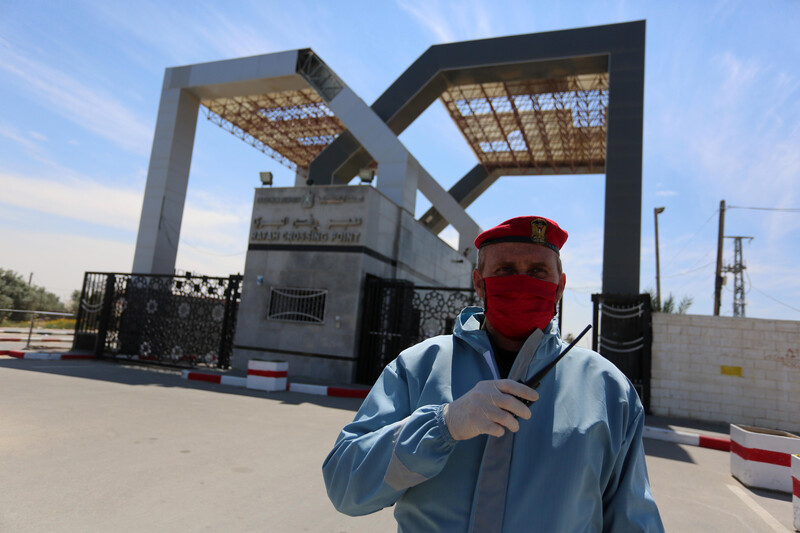Rights and Accountability 14 April 2020

A security officials of Hamas, the resistance organization running the interior of the besieged Gaza Strip, dressed in protective gear at the Rafah crossing between Egypt and Gaza on 13 April.
APA imagesPalestinians under siege in Gaza remain at the mercy of Israel as they face the coronavirus pandemic.
The Gaza Strip ran out of COVID-19 testing kits last week.
Ashraf al-Qedra, the health ministry spokesperson in Gaza, said on 8 April that hundreds of people will remain quarantined as dozens of samples await testing.
On Sunday, Israel allowed five test kits from the World Health Organization into Gaza and testing resumed.
Those would be enough to test 500 people in a population of two million.
“We need to carry out these tests all the time and therefore, we are in need of thousands of testing kits,” al-Qedra said, according to Reuters.
There are currently more than 600 Palestinians quarantined in 17 centers in the enclave.
The coronavirus pandemic has sickened 13 Palestinians in Gaza and approximately 300 in the occupied West Bank, where two people have died.
There are almost 12,000 confirmed cases in Israel and more than 100 dead.
So far, all confirmed cases in Gaza were discovered among individuals already in quarantine, according to Gaza’s health ministry.
The ministry denied rumors that someone escaped mandatory isolation and was on the loose.
Al-Qedra reiterated that hospitals in Gaza remain ill-equipped to deal with a full-blown outbreak, which human rights groups have warned would be catastrophic.
Meanwhile, Turkey finished preparing a hospital it supports in Gaza to care for COVID-19 patients.
Al-Qedra is appealing for international organizations to provide 100 ventilators and 140 beds for intensive care units.
He reiterated that Israel is ultimately responsible under the Fourth Geneva Convention for guaranteeing the basic health and welfare of the Palestinian population in Gaza.
Israeli responsibility
Israel has imposed a siege on Gaza’s two million population for the past 13 years and controls the passage of goods in and out of the territory.
It is indeed Israel’s legal obligation as a military occupier under international law to guarantee basic services and health infrastructure for Palestinians in the occupied West Bank and Gaza Strip.
Not only does Israel habitually disregard its obligations, but it treats it as an act of goodwill and magnanimity when it does allow minimal supplies to reach Gaza.
COGAT, the bureaucratic arm of Israel’s military occupation, which implements the collective punishment of Gaza’s inhabitants, often takes to Twitter to show off what it allows into the territory.
On Sunday, COGAT said it delivered a testing device to al-Shifa hospital in Gaza City on behalf of an international organization it did not name, with the help of the World Health Organization.
It also boasted of the medical supplies it allowed through the Kerem Shalom checkpoint, the only place Israel allows goods in and out of Gaza, in the last week of March and early April: No matter how many tons of medical supplies COGAT allows into the Strip, that does not absolve Israel from its duty to guarantee appropriate health infrastructure for the besieged territory.Lifting restrictions
The Israeli human rights group Gisha is calling on COGAT and Israel’s defense ministry to lift their restrictions on a long list of so-called “dual-use” items which Israel claims may have military purposes.
These include medical supplies like glycerine and hydrogen peroxide, which is used as a disinfectant.
“It is crucial, now more than ever, that Israel remove restrictions hindering Gaza’s economy,” Gisha said.
The group urged that Israel lift restrictions especially on “sectors that provide food for the local civilian population and that could provide a source of income for thousands of people.”
Those include Gaza’s fishing and farming industries.
Israel hinders the entry of fiberglass, steel cables, boat engines and spare parts, all crucial for the maintenance and repair of fishing boats.
“Still, applications made by suppliers to coordinate the entry of these products have been delayed or received no response,” Gisha said.
Israel also prevents fertilizers and pesticides from entering Gaza in the quantities required by farmers to increase their yields.
To top it off, the Israeli military resumed earlier this month spraying herbicides along Gaza’s eastern boundary, some of the territory’s most fertile agricultural land.
For years, Israel has poisoned and razed land along the boundary, and shot at farmers, to increase its soldiers’ field of vision.
While Israel releases the herbicides on its side of the boundary, the wind blows the poisons into Gaza.
In January, according to Gisha, farmers reported that many acres of “parsley, peas, wheat and barley, stretching up to 600 meters into the Gaza Strip, sustained heavy damage.”




